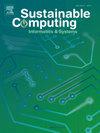An MPPT integrated DC-DC boost converter for solar energy harvester using LPWHO approach
IF 3.8
3区 计算机科学
Q1 COMPUTER SCIENCE, HARDWARE & ARCHITECTURE
引用次数: 0
Abstract
Due to high maintenance costs and inaccessibility, replacing batteries regularly is a major difficulty for Wireless Sensor Nodes (WSNs) in remote locations. Harvesting energy from multiple resources like sun, wind, thermal, and vibration is one option. Because of its plentiful availability, solar energy harvesting is the finest alternative among them. The battery gets charged during the day by solar energy, and while solar energy is unavailable, the system is powered by the charge stored in the battery. Hence, in this paper, a highly efficient Solar Energy Harvesting (SEH) system is proposed using Leadership Promoted Wild Horse Optimizer (LPWHO). LPWHO refers to the conceptual improvement of the standard Wild Horse optimization (WHO) algorithm. This research is going to focus on overall harvesting efficiency which further depends on MPPT. MPPT is used as it extracts maximal power from the solar panels and reduces power loss. The usage of MPPT enhances the extracted power’s efficiency out of the solar panel when its voltages are out of sync. At last, the supremacy of the presented approach is proved with respect to varied measures.
一种采用LPWHO方法的太阳能采集器用MPPT集成DC-DC升压变换器
由于高维护成本和不可访问性,定期更换电池是远程无线传感器节点(wsn)的主要困难。从太阳能、风能、热能和振动等多种资源中获取能量是一种选择。由于其丰富的可用性,太阳能收集是其中最好的选择。电池在白天通过太阳能充电,当太阳能不可用时,系统由电池中存储的电荷供电。因此,在本文中,提出了一个高效的太阳能收集(SEH)系统使用领导促进野马优化器(LPWHO)。LPWHO是对标准的野马优化(Wild Horse optimization, WHO)算法的概念改进。本研究将侧重于整体收获效率,这进一步取决于最大收获效率。使用MPPT是因为它从太阳能电池板中提取最大的功率并减少功率损失。当电压不同步时,MPPT的使用提高了从太阳能电池板中提取的电力的效率。最后,从不同的措施上证明了该方法的优越性。
本文章由计算机程序翻译,如有差异,请以英文原文为准。
求助全文
约1分钟内获得全文
求助全文
来源期刊

Sustainable Computing-Informatics & Systems
COMPUTER SCIENCE, HARDWARE & ARCHITECTUREC-COMPUTER SCIENCE, INFORMATION SYSTEMS
CiteScore
10.70
自引率
4.40%
发文量
142
期刊介绍:
Sustainable computing is a rapidly expanding research area spanning the fields of computer science and engineering, electrical engineering as well as other engineering disciplines. The aim of Sustainable Computing: Informatics and Systems (SUSCOM) is to publish the myriad research findings related to energy-aware and thermal-aware management of computing resource. Equally important is a spectrum of related research issues such as applications of computing that can have ecological and societal impacts. SUSCOM publishes original and timely research papers and survey articles in current areas of power, energy, temperature, and environment related research areas of current importance to readers. SUSCOM has an editorial board comprising prominent researchers from around the world and selects competitively evaluated peer-reviewed papers.
 求助内容:
求助内容: 应助结果提醒方式:
应助结果提醒方式:


